

Ec.europa.eu/culture/our-programmes-and-actions/doc/ecoc/ecoc-proposition-candidature_en.pdf. European Commission - Culture. In 2003 the European Commission launched a tender to commission an analysis and synthesis of the events "European Capital/City of Culture" and "Cultural Months" for the years 1995 to 2004, on the basis of documented information.
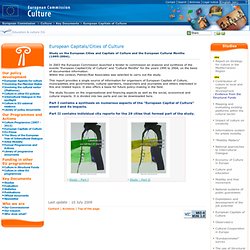
Within this context, Palmer/Rae Associates was selected to carry out the study. This report provides a single source of information for organisers of European Capitals of Culture, municipalities and governments, cultural operators, researchers and journalists and others interested in this and related topics. It also offers a basis for future policy-making in the field. The study focuses on the organisational and financing aspects as well as the social, economical and cultural impacts. It is divided into two parts and can be downloaded here. Legislatura 16ª - Disegno di legge N. 3068.
Onorevoli Senatori. – Il presente disegno di legge mira ad introdurre nel nostro Paese il programma annuale «Città italiana della cultura».
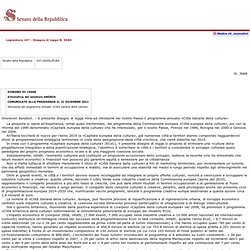
La proposta si ispira all’esperienza, ormai quasi trentennale, del programma della Commissione europea «Città europea della cultura», poi con la riforma del 1999 denominato «Capitale europea della cultura» che ha interessato, per il nostro Paese, Firenze nel 1986, Bologna nel 2000 e Genova nel 2004. All’Italia toccherà di nuovo per l’anno 2019 la «Capitale europea della cultura», già numerose città e territori stanno compiendo ragguardevoli sforzi di programmazione strategica territoriale in vista della designazione della città vincitrice, che verrà stabilita nel 2015.
Art. 1. (Oggetto) 1. 2. Ec.europa.eu/culture/documents/ecoc_proposition_candidature_it.pdf. Www.etwinning.net/files/IT_eTwinning_Report_2012.pdf. Compendium Thematic Space - Intercultural cities. Joint action of the Council of Europe and the European Commission The Intercultural cities programme emerged from the Council of Europe's significant experience of projects that focus on issues concerned with the management of diversity.
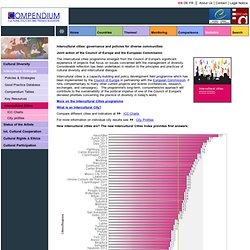
Considerable reflection has been undertaken in relation to the principles and practices of cultural diversity and intercultural dialogue. Intercultural cities is a capacity-building and policy development field programme which has been implemented by the Council of Europe in partnership with the European Commission. It runs complementary to many other current projects and events (conferences, research, exchanges, and campaigns). The programme's long-term, comprehensive approach will contribute to the sustainability of the political impetus of one of the Council of Europe's declared priorities concerning the practice of diversity in today's world. An intercultural city has people with different nationality, origin, language or religion / beliefs. Il sito ufficiale dell'Unione europea. Culturemap - Home. Intercultural Dialogue Europe.
Documentation Centre on European Capitals of Culture - Home. European Commission - Past European Capitals of Culture. European Commission - European Capitals of Culture. Each year, cities chosen as European Capitals of Culture – in 2014 Umeå and Rīga – provide living proof of the richness and diversity of European cultures.
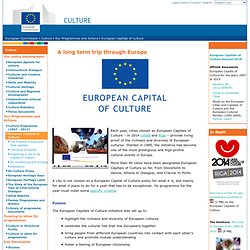
Started in 1985, the initiative has become one of the most prestigious and high-profile cultural events in Europe. More than 40 cities have been designated European Capitals of Culture so far, from Stockholm to Genoa, Athens to Glasgow, and Cracow to Porto. A city is not chosen as a European Capital of Culture solely for what it is, but mainly for what it plans to do for a year that has to be exceptional. Its programme for the year must meet some specific criteria. Purpose. Doc633_it/ manuale di candidatura-basic facts. European Commission - Culture. Each year, cities chosen as European Capitals of Culture – in 2011 Tallinn, and Turku – provide living proof of the richness and diversity of European cultures.
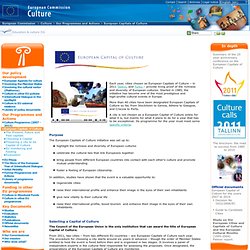
Started in 1985, the initiative has become one of the most prestigious and high-profile cultural events in Europe. More than 40 cities have been designated European Capitals of Culture so far, from Stockholm to Genoa, Athens to Glasgow, and Cracow to Porto. A city is not chosen as a European Capital of Culture solely for what it is, but mainly for what it plans to do for a year that has to be exceptional.
Its programme for the year must meet some specific criteria. Purpose. European Commission - Culture. Creative Europe Project Results Here you can find project information and results of projects supported by the European Commission under the current Creative Europe programme and under the previous Culture 2007-2013 programme. eTwinning The free and safe platform for teachers to connect, develop collaborative projects and share ideas in Europe.
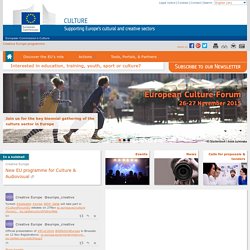
European Commission - Culture. European Commission - Preparing a city to be Capital of Culture. The European Capital of Culture is one of the most prestigious and high-profile European cultural events, with demanding requirements to match.
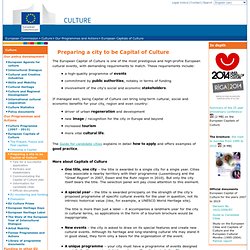
These requirements include: a high-quality programme of events commitment by public authorities, notably in terms of funding involvement of the city's social and economic stakeholders. If managed well, being Capital of Culture can bring long-term cultural, social and economic benefits for your city, region and even country: European Commission - Selection criteria. Proposals for the European Capital of Culture title are assessed against criteria laid down in the Decision on the European Capital of Culture 2007-19 – 1622/2006/EC.
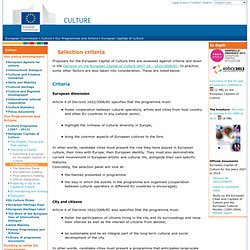
In practice, some other factors are also taken into consideration. These are listed below. Criteria European dimension Article 4 of Decision 1622/2006/EC specifies that the programme must: foster cooperation between cultural operators, artists and cities from host country and other EU countries in any cultural sector; highlight the richness of cultural diversity in Europe; bring the common aspects of European cultures to the fore. In other words, candidate cities must present the role they have played in European culture, their links with Europe, their European identity. The themes presented in programme the way in which the events in the programme are organised (cooperation between cultural operators in different EU countries is encouraged). Programma LLP.
Elena Maddalena Finalmente disponibili on line l'Invito generale a presentare candidature nell'ambito di Erasmus+, con le principali scadenze per le Attvità Chiave 1 Mobilità per l'apprendimento e Attività Chiave 2 per la cooperazione, e la Guida per i candidati Le organizzazioni che nel 2014 desiderano trasmettere una candidatura per ottenere un finanziamento attraverso Erasmus+, il nuovo programma dell'Unione europea a favore dell'istruzione, della formazione, dei giovani e dello sport, possono iniziare fin da subito a preparare le domande di sovvenzione.
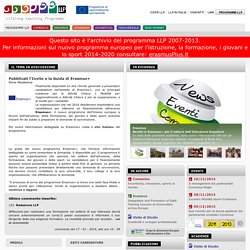
Per avere informazioni dettagliate su Erasmus+ visita il sito italiano del programma: La guida del nuovo programma Erasmus+, che fornisce informazioni dettagliate su come presentare la domanda, è disponibile qui. La Commissione europea. Cosa facciamo Le principali funzioni della Commissione sono: Riunioni ordinarie e straordinarie I commissari si riuniscono una volta a settimana (solitamente il mercoledì) a Bruxelles.
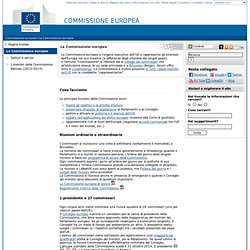
La riunione dei commissari si tiene invece generalmente a Strasburgo quando il Parlamento vi è riunito in sessione plenaria. L'ordine del giorno delle singole riunioni si basa sul programma di lavoro della Commissione. European Commission - Choosing a Capital. The order, given below, was decided in agreement with the Member States and laid down in the Decision on the European Capital of Culture 2007-19 – 1622/2006/EC Selection procedure for Capitals of Culture in 2013 and beyond Under the new procedure – which entered into force in early 2007 and applies to the 2013 title and subsequent titles – host countries are responsible for selecting a city. The relevant authorities in the host countries publish a call for applications 6years before their turn to host.
Cities interested in winning the title must submit their proposal by replying to a questionnaire, within around 10 months. Pre-selection – a panel of independent experts in the cultural field meets approximately 5 years before the year to assess the initial proposals against the criteria and to issue a short list of cities (pre-selection).